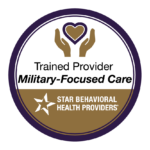
Updated December 2, 2024 ***
This year has been a doozy to say the least. We noticed that there were a few more hits to our blog talking about cognitive behavioral therapy tips for a less stressful holiday this year, so we wanted to update it for 2024. Given all that’s happened in the past few years, especially 2024, we could all use a refresher. So, read on for therapist-approved tips to reduce stress during the holidays.
Have you noticed that during the holiday season thoughts like, “I have to…”, “I should…”, I always…” or “ugh not again.” always seem to pop up? It’s not unusual for holidays to be filled with expectations, whether they’re placed upon ourselves, those around us, or both. The perfect holiday can leave us filled with anxiety and disappointment. The negative thoughts we are left with can make us wonder if it might be better if the Grinch just stole Christmas.
It’s Normal To Feel Down During The Holidays
As a Scottsdale therapist working with clients around the holidays, I often notice trends in clients experiencing increased stress and anxiety. Frequently, my clients ask me about negative emotions they feel this time of the year – feelings like guilt, shame, depression, exhaustion, and loneliness, just to name a few. The holidays are a time of year when we are all trying to feel more joyous and grateful. I’m here to let you know that if trying is as far as you get, you’re not alone.
Healthline did a survey in 2016 which indicated that 60% of adults in the US suffer from stress during the holidays. The stressor reported in the Healthline study were most concentrated on scheduling (who do we need to see, how do we fit it all in, and the cause of this stress can basically be summed up with two words- EXPECTATION and OBLIGATION), finances (gift-giving, traveling, hosting and charity – BUDGET BUST) and health (diet, exercise- the fact is maintaining self-care habits during the holidays sure can be difficult because we are more freely giving away our time).
With statistics updated for 2024, in a study by the American Psychological Association, we see that about 89% of adults surveyed in the US said that financial concerns, missing loved ones, and anticipated family conflict are now the major stressors.
There is Hope & Joy to be Found
Since the latest studies in 2024 show us that 9/10 people fall into the stressed out during the holidays category, and since you probably found this article because you’re currently looking for solutions to your stress, let’s get to the joyous part as fast as possible. Cognitive behavioral therapy (CBT) helps us identify a problem thought or feeling before turning it into a problem behavior or action. CBT focuses on coping skills, helping us move out of bah-humbug and into holiday joy.
Cognitive behavioral therapy can help with so many conditions. CBT for anxiety, CBT for depression, and CBT for OCD are just three of the many conditions that CBT therapy can improve. Let’s dive in a little deeper.
Here are 5 Cognitive Behavioral Therapy tools that will help you get through the holidays with a little less stress.
1) Recognize Negative Thoughts
Can you recognize the negative thoughts? For example, if you’re worried about being able to afford a present for everyone on your list and also keep food on the table, you can worry all day and all night, but ask yourself:
- “How is this thought impacting me?”
- “When this thought comes-up what are the behaviors I do in relation to it?”
- “Is this helping me?”
- “Is this thought productive?”
This process starts by creating awareness instead of avoiding negative thoughts. It’s OK to think about these very real thoughts that affect us in our realities. But dwelling on the same negative thoughts without recognizing them isn’t doing anyone any favors, least of all ourselves.
2) Recognize Thought Patterns
Not recognizing patterns of thinking can get you stuck. In CBT, this stuck pattern of thinking is called cognitive distortion. These thoughts (distortions) can show up in a few different ways:
- Black and White thinking (there are only two options total success or total failure)
- Example: Jenna is hosting her first family holiday dinner. She believes, “If the turkey isn’t perfect, the whole evening will be a disaster.”
CBT Strategy: Recognize that success isn’t all-or-nothing. Remind yourself that even if one part of the dinner doesn’t go as planned, it doesn’t mean the evening will be ruined. Focus on the joy of gathering together.
- Example: Jenna is hosting her first family holiday dinner. She believes, “If the turkey isn’t perfect, the whole evening will be a disaster.”
- Overgeneralizing (They all, you all, always…)
- Example: Ben hasn’t heard back from his sister about Christmas plans and thinks, “She never cares about spending the holidays with me. She always puts her friends first.”
- CBT Strategy: Look at the facts. Ask yourself if “never” and “always” are accurate. Consider alternative explanations, like her being busy or overwhelmed.
- Catastrophizing (this is going to be the worse, nothing good will come out of this)
- Example: Maria is worried about seeing her uncle, who tends to bring up divisive topics. She thinks, “The family gathering will turn into a huge argument, and everyone will leave upset.”
- CBT Strategy: Separate assumptions from reality. Plan ways to steer conversations or excuse yourself if needed. Remember, one person’s actions don’t define the entire event.
- Minimizing or Discounting the Positive (it was insert something positive but insert the reason it’s not really positive…)
- Example: David decorates his home and gets compliments from neighbors. Instead of accepting the praise, he thinks, “It’s just lights; anyone could do that.”
- CBT Strategy: Acknowledge your efforts and positive outcomes. Practice saying, “Thank you,”and reflect on the joy your efforts bring to others.
So every time you notice a distortion, point it out to yourself – if you can see the distortion, you can do something about it.
3) Reframe The Thought
Our thoughts should help us get and do the things that bring us joy, or at least they shouldn’t hurt us. Reframing is taking a negative thought and moving the thought to something more helpful, maybe positive or even affirming.
- Step One: Follow tools 1 & 2 (Recognize negative thoughts and thought patterns)
- Step Two: Ask yourself what would you say to a friend? Would you poke holes in the thought with objectivity, can you truly tell, can you identify strengths, can you find exceptions that are positives, can you break it down into steps? Try this out, and I would bet that negative thought can’t hold its ground.
Replace the negative thought with a balanced one.
- Example: Reframe “This is going to be the worst holiday ever” to “This holiday may have challenges, but I can still find moments of joy.”

4) Give Yourself a Break
Identify your stress, and when levels are rising, take a break. The break can be a literal break like a 5-minute walk or even canceling plans in the name of mental health. The break can be breath work (don’t ignore the breath app on your apple device, recall that yoga instructor or google it) or give yourself a statement of support “this will be okay.”
5) Manage Harmful Behaviors
Finally, manage harmful behaviors if you find yourself doing things that don’t make you feel good (spending too much money, drinking too much, or simply saying ‘yes’ when you know that you should really say ‘no’). Let 2024 be the year you give yourself permission not to repeat the negative patterns. You can leave, say ‘no’ or simply tell someone how continuing this (whatever it is) makes you feel.
Make room for a little more JOY! Happy Holidays from MUV Counseling. If you find yourself stuck, it might be the right time to consider therapy. MUV Counseling offers in-person Scottsdale therapy or online therapy to individuals in Arizona, Tennessee, Washington, and Oregon.




